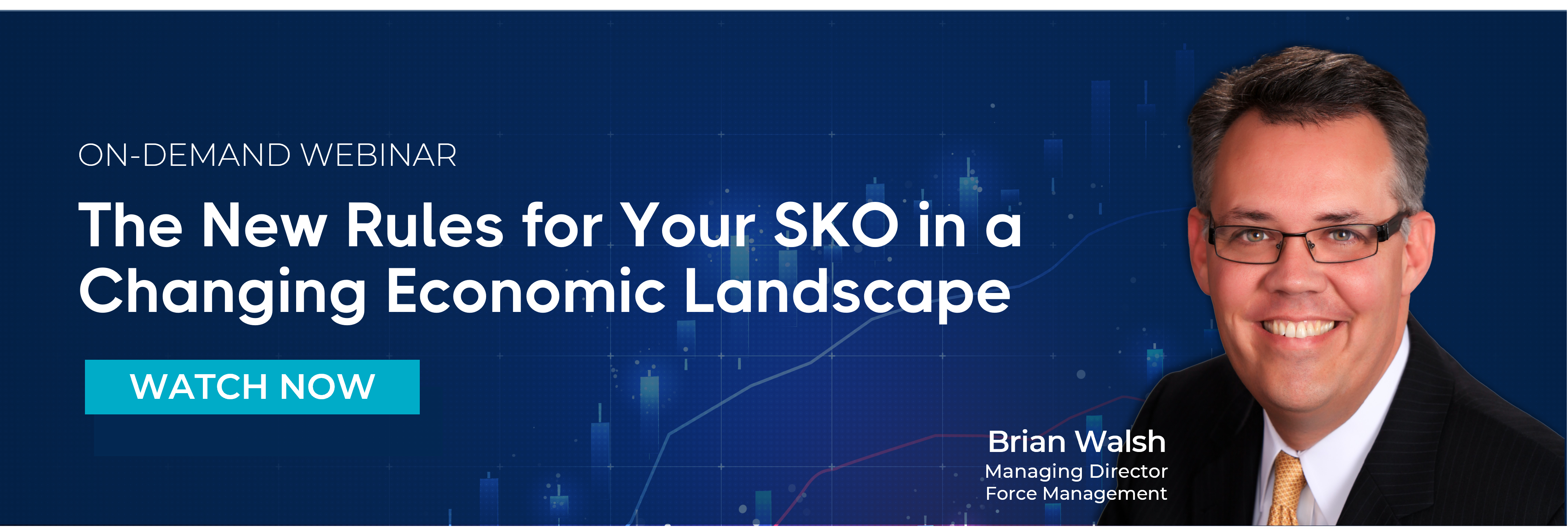
Align Your SKO Agenda to the Company Growth Strategy
Categories: Company Alignment | Sales Kickoff
This blog contains content from our Ultimate Sales Kickoff Resource Guide. Check out all our sales kickoff resources, best practices and tools here.
One of the keys to a successful sales kickoff is to execute it in a way that aligns with your organization's overall business strategy. Given the current economic landscape, your company's strategy may be evolving or shifting.
Sales alignment with the yearly goals of the company are critical. Because you have a limited amount of time and frankly, attention of your attendees, it’s important that you ensure what is presented and delivered during the SKO supports your team’s ability to execute next year. As the external market continues to shift, your salespeople will likely welcome the transparency on business initiatives and support for hitting critical revenue targets.
Focus on the areas below to align your company’s business strategy to your SKO agenda:
1. Define your objectives before you build the agenda
The SKO is your opportunity to address your sales organization, discuss the plan for next year, and lay out how you’re going to support your sales team in hitting critical revenue benchmarks. Consider the specific and measurable objectives of a SKO that are aligned with your company’s overall strategy.
Do reps need to understand new product bundles and the current business problems they solve for buyers in today's economic landscape? Are you trying to ensure reps don't resort to discounting in long-term contracts? Work back from the end game. Define what you want your sales team to achieve immediately following your SKO and a month, quarter, or year on. Define your long-term and short-term objectives, then build a SKO agenda that will be the right jumping-off point for your sales organization to achieve those goals.
2. Include time to share your purpose
If you’re in a leadership role, it’s likely obvious to you how the overall company strategy will impact the sales team's ability to execute in a challenging economic environment. Don’t assume your sales team members are linking the two together. Make the connection clear to your salespeople. How will the direction the company is headed benefit your sellers and affect their day-to-day?
What will those changes look like in action, as reps work with their account teams, managers and customers? Spend time during your event to communicate these critical concepts. The connection should be clear to everyone in the room. Once they understand the why, they'll be more likely to participate in the aligned activities and execute after the SKO ends.
3. Tie each activity to your core objectives
Once you have clear objectives, build out the SKO agenda in a way that will help your team learn the concepts and skills they need to execute. Consider, what execution gaps do you need to solve? What capabilities do you need to train your team on?
Design the SKO training, presentations and deliverables in a way that equips your team with the consumable tools, skills and capabilities they need to draft into the overall company strategy. Ask yourself, what are those skills and capabilities in action? Does my team have the content and resources they need to execute those high-value sales activities?
Oftentimes, it’s these questions that lead sales leaders to reassess the need for a broader sales initiative beyond just a SKO event. Will two days or a one-week virtual SKO be enough time to bring your team up to speed to execute? You may be able to get some activities done ahead of time (see number five). However, it’s critical that you assess if a SKO event gives you the time you need to shift seller behaviors and mindsets. The SKO may provide ample time, or you may need to adjust your approach. This assessment can help you decide where you stand.
4. Build relevancy into the event and deliverables
Everything presented during your SKO should be highly relevant to the day-to-day jobs of the people in the room. Use your kickoff as an opportunity to make company shifts relevant to your salespeople. Help them see how core concepts covered in the SKO will impact their day-to-day rhythm, especially as they gear up to sell in a complex economy.
Make your agenda practical and customized in this way. Your sales reps, managers and other participants should see how each activity and presentation relates back to their day-to-day tasks.
The challenge with a SKO is that you likely have a wide range of roles represented in the room. Perhaps you're launching a new product or a new sales process. Think about how you're going to present that information in a way that is relevant and consumable to everyone in the room. Here are a few questions you may want to consider as you define the invite list:
- How does this concept relate to your SDRs/BDRs?
- How does this agenda relate to account teams, field reps, managers, etc.?
- Will your managers benefit from training that’s specific to their role in coaching new concepts and driving accountability?
Although it takes a concerted effort, aligning aspects of the SKO training, deliverables and reinforcement activities to each role will play a major role in your success. If the event is not relevant to what each audience member does every day — participants will tune out. Your event may still be compelling but it will result in varying levels of success across your organization.
Make your SKO highly relevant to each participant by customizing the content and training to each different role in your sales organization. Then, ensure the event provides practical applications for each individual role. One option we use is to provide time during the event for breakout sessions defined by roles.
5. Consider what needs to happen before and after the SKO
What are the pre-SKO and post-SKO activities you need to consider to ensure success? If your company is making strategic shifts to align with market changes, that shift will likely require more than one SKO event to equip sales to hit revenue targets.
Again, changing the entire mindset of your sales team may require a broader initiative and plan to generate sales organization alignment. When looking at your agenda, consider what activities you can do before the event that will get reps moving towards the new goal. We often have reps complete pre-work on new concepts before a SKO, so we can maximize time during the virtual or in-person training.
It's equally as important to assess your agenda for what you can do after the event, to improve adoption and reinforcement. Have a ready-to-launch plan for after the event.
Remember, you don’t want to stuff ten days worth of content into two. Be focused with your agenda.
Start Building a SKO that Propels Your Sales Team to Success
When you're planning a sales kickoff, you'll find the most success when you execute it in a way that aligns with your organization's overall business strategy. Given the economic climate, your go-to-market approach may already be shifting. Consider how you can align your team accordingly, and make it happen with your SKO.
Now is the time to ensure you and your enablement team are designing a SKO that will equip your sales team to weather economic change and come out stronger. Build an agenda that helps you make it happen. We’ve got sales kickoff resources that may help you move in the right direction. Use them as you work to develop an actionable strategy for launching a SKO that moves the needle.



